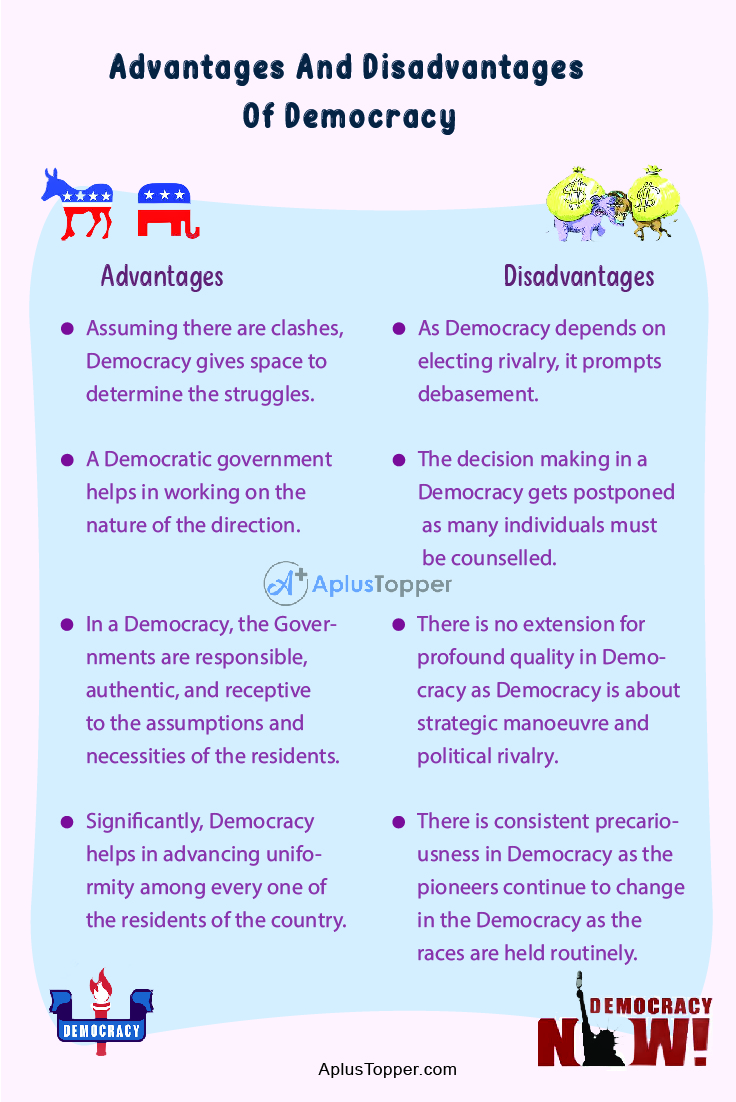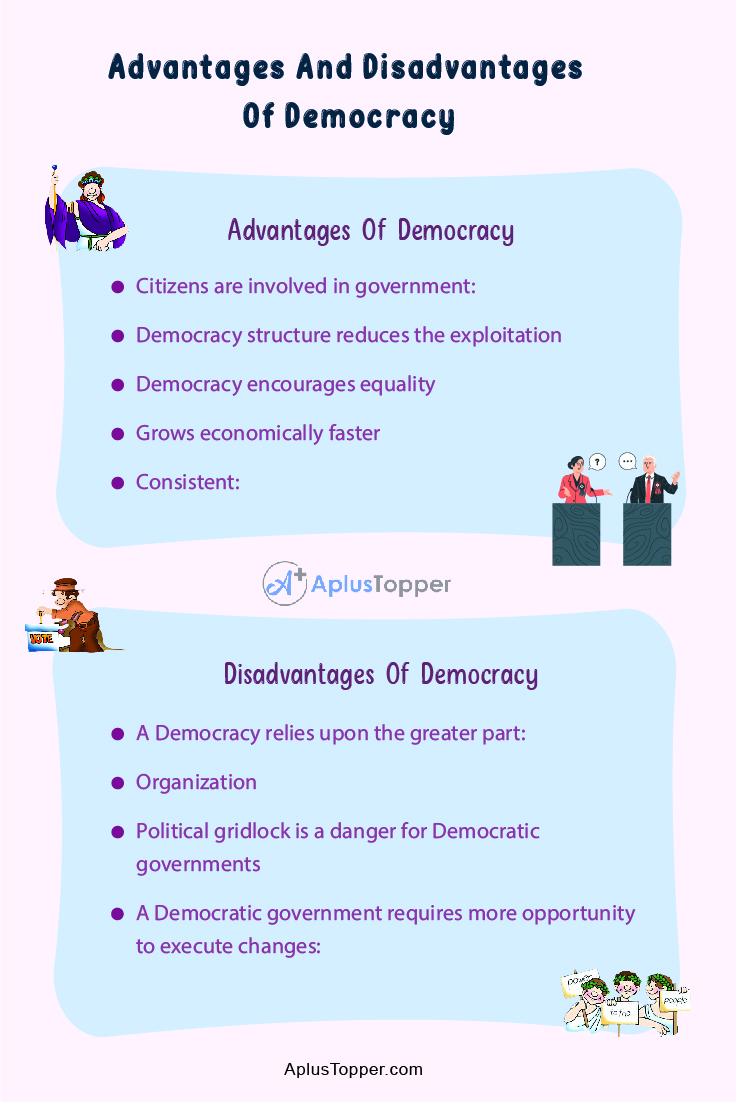Advantages And Disadvantages Of Democracy: A Democratic government is an arrangement of government where the whole populace or qualified individuals from the state have the chance to decide on issues straightforwardly or send somebody that they choose to settle on those choices for their sake. It is an overseeing structure where rule comes from individuals rather than the military or state. A majority rules government is a political framework that is administered straight by individuals or through chosen agents. This article educates you regarding the benefits and hindrances of a Democratic government.
Students can also find more Advantages and Disadvantages articles on events, persons, sports, technology, and many more.
What is Democracy? Advantages And Disadvantages Of Democracy 2022
Democracy is a political framework that incorporates establishments that permit people to communicate their political perspectives, limit chief power, and safeguard common opportunities. The two points of support that support the vote based standards of freedom are political cooperation and political contestation.
For an ideal Democratic government, free, fair, and serious decisions should be held. power should be flawlessly moved to start with one individual then onto the next. After the votes have been classified and the victor has been broadcasted. Contestation alludes to individuals’ capacity to articulate their thoughts unafraid through free discourse and the press.
A considerable lot of the best nations on the planet, including the US, work under a majority rule type of government. While a Democracy is noted as quite possibly the most effective government framework ever, it is, nonetheless, not with practically no drawbacks. Allow us to investigate its benefits and weaknesses.
- Advantages Of Democracy
- Disadvantages Of Democracy
- Comparison Table for Advantages And Disadvantages Of Democracy
- FAQ’s on Pros and Cons of Democracy
Advantages Of Democracy
- Citizens are involved in government: Since the public authority in a Democratic government is heavily influenced by individuals and their voice, then, at that point, it is dependent upon every person to determine their destiny. Individuals can decide to cast a ballot in the manner their ethical quality directs. Some even give electors the choice to not cast a ballot assuming that is the thing they feel is the most effective way to offer their viewpoint.
- Democracy structure reduces the exploitation: All administration developments are touchy to abuse due to individuals who get chosen into strong positions. The differentiation with a Democracy is that the specialists are circulated all the more similarly inside it. The decision reports in this design make governing rules to guarantee that no single individual gets preeminent control over the administrative cycle.
- Democracy encourages equality: The construction of a Democracy provides each vote with an equivalent measure of weight during a political race. This choice allows every individual the opportunity to project a voting form without judgment when they register for this cycle, giving an assessment in spite of their social or financial status. Everything “yes” or “no” considers one, regardless of whether you are rich or poor, own property or not, or express your orientation with a particular goal in mind.
- Grows economically faster: The opportunity presented in the construction of a Democratic government permits everybody to look for any outcome they need. Albeit lawful boundaries exist to keep one individual from harming another, this administering structure gives the opportunity to search for various work amazing open doors, schools, or even places to reside. The decision stays with your voice.
- Consistent: There is greater solidarity in the administering system with a Democratic government in light of the fact that everybody holds the option to decide on goals. This course of action can take various styles, however, the outcome is for the most part something similar. Every individual finds the opportunity to communicate their view at their surveying stations by making a choice. That interaction permits every local area to keep seeking after the particular outcomes that they feel are useful, or they can change headings to take a stab at a new thing.
- No centralised power to rule over people: In an immediate Democratic government, each choice would be set to a decision in favour of an incomparable degree of control. Regardless, there is no brought together power that can direct what individuals would be able or can’t do. Each part of the public authority should settle on the interaction. Then, at that point, every local area can settle on choices with their democratic ability to upset undesirable standards and guidelines to develop life over the long haul.
- Helps in increasing patriotism among people: The designs of a Democratic government are special since they permit everybody to battle for the things that they need throughout everyday life. Every individual can seek after their fantasies, attempting to form a society in a dream that lives up to their assumptions. In any event, when that thought opposes what the larger part needs or falls outside of a normal window of profound quality, there is a capacity to communicate those thoughts expecting that others are not wounded by such a work.
- Reduces conflicts with other countries: As a Democracy has come through Europe by and by, the degrees of fighting between the significant countries on the mainland have diminished fundamentally. There have been fewer struggles in the beyond 50 years than at some other time ever. Albeit the United States is a special case for this advantage in light of the country’s status on the worldwide stage, most countries who center around a Democratic government stay away from fights as opposed to pursuing them.

Disadvantages Of Democracy
- Residents should realize the majority rules government rules: A Democratic government permits a person to make a choice either straightforwardly or through a favoured delegate on the issues that the public authority should make due. There is no heading regarding how electors approach this obligation. Albeit certain individuals will teach themselves on each issue to express an accomplished viewpoint, there is no prerequisite to go through the entirety of this work. Somebody can turn in a polling form that is a straight-party ticket without really any thought of the singular perspectives or necessities.
- A Democracy relies upon the greater part: History has instructed us that the desire of the larger part isn’t dependably the moral or moral place that one should take. We have managed issues like bondage, separation, and orientation disparity in the past on the grounds that the point of view of those with the most votes says that society has the right to have those components. In the event that somebody ends up outside of the desire of the greater part as a general rule, then, at that point, it will feel like their vote doesn’t actually mean something.
- A Democratic government requires more opportunity to execute changes: Democratic government designs can make announcements on rules, guidelines, or reactions that are not consistently imaginable in a majority rule structure. Casting a ballot expects time to survey the data given by every political race. That implies processes are delayed down to where it can require quite a long while to make huge changes. There may just be 1-2 authoritative bills that follow through in a whole meeting that go past the commonplace spending plans, advisory groups, and designations that authorities make due.
- Organization: Another limitation of a Democracy is that defilement is normal in government workplaces and offices because of regulatory culture, which makes a joke of all administration projects and plans since the genuine advantage of magnificent approaches doesn’t contact individuals for whom they are planned. In essential terms, the public authority in a Democracy endeavor to make the best decision mentally, however on the ground, it doesn’t help individuals, causing misery among the nation’s residents.
- Political gridlock is a danger for Democratic governments: Politicians in a Democracy are additionally impacted by polarization, which keeps individuals from tolerating different perspectives. It isn’t extraordinary for government governing rules to create superfluously long setbacks for the execution of laws.
Comparison Table for Advantages And Disadvantages Of Democracy
| Advantages | Disadvantages |
| In a Democracy, individuals anticipate that the public authority should work for their government assistance. This could be through the advancement of power, streets, through the arrangement of lodging, work, wellbeing, training, and so on | As Democracy depends on electing rivalry, it prompts debasement. |
| A Democracy gives space to address the slip-ups. | As any normal resident can challenge races and win races, and any resident can choose its Government agents, it is contended that standard residents who don’t have any idea what they want ought not to be associated with the direction. |
| Assuming there are clashes, Democracy gives space to determine the struggles. | Chosen Government delegates wind up settling on terrible choices as they’re not sure what choice taken is to the greatest advantage of individuals. |
| A Democratic government helps in working on the nature of the direction. | The decision making in a Democracy gets postponed as many individuals must be counselled. |
| In a Democracy, the Governments are responsible, authentic, and receptive to the assumptions and necessities of the residents. | There is no extension for profound quality in Democracy as Democracy is about strategic manoeuvre and political rivalry. |
| Significantly, Democracy helps in advancing uniformity among every one of the residents of the country. | There is consistent precariousness in Democracy as the pioneers continue to change in the Democracy as the races are held routinely. |

FAQ’s on Pros and Cons of Democracy
Question 1.
What are the advantages of democracy?
Answer:
A comprehensive and fair society. Democracy pursues a general public where everybody is regarded and free. Free and diversified races We get to represent political race and pick who settles on choice for our sake. Law and order for the two residents and the public authority Everyone is equivalent under the steady gaze of the law and should keep the law.
Question 2.
What are the disadvantages of democracy?
Answer:
Democratic government is shaky. Opinions of many individuals in dynamic prompts delays. Chosen agents don’t have the foggiest idea about the wellbeing of individuals which prompts awful choices. It prompts debasement since it depends on electing contest.
